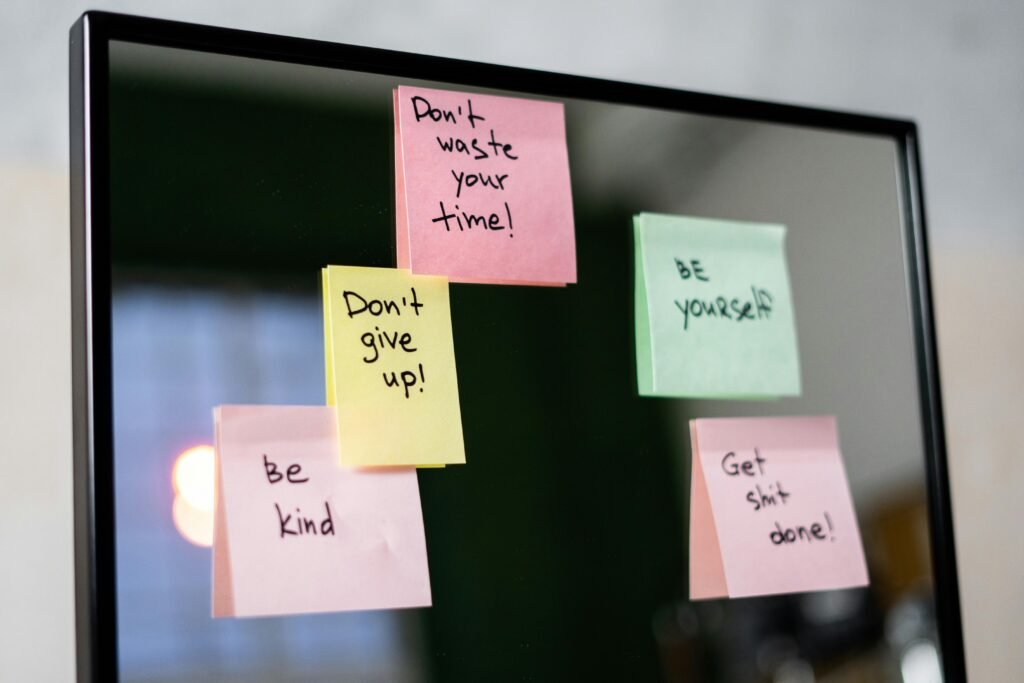
Introduction to Emotional Resilience
Emotional resilience is the ability to recover from stress and adapt to challenging situations.
It’s an essential skill that can help us navigate the ups and downs of life more effectively.
Developing emotional resilience involves strengthening our mental capacity to deal with stressors and bounce back from adversity.
One of the primary ways to build emotional resilience is through self-awareness techniques.
Self-awareness allows us to understand and manage our emotions, thoughts, and behaviors better.
By being more attuned to our internal states, we can make more informed decisions about how to respond to difficult situations.
For instance, self-awareness helps us recognize when we’re feeling overwhelmed, allowing us to take steps to address it before it escalates.
This might involve taking a short break, practicing deep breathing, or engaging in another form of self-care.
By being proactive, we can prevent minor stressors from becoming major issues.
Additionally, self-awareness techniques can help us identify patterns in our emotional responses.
Maybe certain situations consistently cause us to feel anxious or frustrated.
By recognizing these patterns, we can develop strategies to manage our reactions more effectively.
For example, if public speaking causes significant anxiety, self-awareness can lead us to practice mindfulness exercises or visualization techniques to reduce this anxiety over time.
Self-awareness also fosters better relationships.
When we understand our own emotional triggers and responses, we can communicate more effectively with others.
This improved communication can lead to more supportive and understanding relationships, which are crucial for emotional resilience.
Finally, self-awareness can guide us in setting and maintaining healthy boundaries.
By knowing our limits and respecting them, we can protect our emotional well-being and prevent burnout.
This might mean saying no to additional responsibilities when we’re already feeling stretched thin or taking time for ourselves to recharge.
Incorporating self-awareness techniques into daily life can have a profound impact on our emotional resilience.
These practices help us become more attuned to our inner experiences, enabling us to respond to challenges with greater ease and confidence.
Practicing Mindfulness

Mindfulness is an effective tool for cultivating self-awareness and building emotional resilience.
It involves paying attention to the present moment without judgment, which can help improve attentional control.
For example, mindfulness exercises such as meditation and deep breathing encourage us to view our thoughts and emotions as passing events.
Regular mindfulness practice has been shown to enhance sustained attention in both beginners and experienced practitioners.
Additionally, mindfulness can protect against a decline in working memory during high-stress periods, making it an essential tool for maintaining emotional resilience.
Engaging in mindfulness exercises regularly can offer numerous benefits.
Start by dedicating a few minutes each day to focus on your breath or observe your thoughts without attachment.
Over time, these practices can help you stay grounded, even amid chaos.
Integrating mindfulness into daily life can also improve your relationships.
By being more present, you can listen more attentively and respond with greater empathy.
This presence can deepen your connections and provide a strong support system that bolsters emotional resilience.
Try incorporating short mindfulness breaks into your routine.
Whether it’s a few deep breaths before a meeting or a quick meditation during lunch, these moments of calm can significantly reduce stress levels.
Experiment with different mindfulness techniques to find what resonates best with you.
Journaling for Self-Reflection

Journaling is a powerful way to enhance self-awareness and build emotional resilience.
By regularly recording thoughts and feelings, individuals can gain insights into their emotional patterns and behaviors.
Mindfulness training has been shown to improve behavioral regulation and reduce self-discrepancy, which is linked to better self-regulation.
Furthermore, mindfulness facilitates a clearer understanding of personal values, leading to behaviors more aligned with those values.
To start a journaling practice, set aside a few minutes each day to write freely about your experiences and emotions.
Over time, this habit can help identify patterns in your thoughts and feelings, providing valuable insights that contribute to emotional resilience.
For instance, you might begin by jotting down how you feel after certain events or interactions.
Do you notice recurring themes, like feeling anxious after meetings or uplifted after spending time in nature?
Recognizing these patterns can help you understand what factors influence your mood and stress levels.
You can also use journaling as a tool for problem-solving.
When faced with a challenge, write down your thoughts and possible solutions.
This practice can clarify your thinking and help you approach problems with a more structured mindset.
Moreover, reflecting on your entries over time can reveal long-term trends and shifts in your emotional state.
You might notice that certain coping strategies are more effective than others, allowing you to refine your approach to stress management.
This ongoing self-reflection can lead to a deeper understanding of yourself and enhance your ability to navigate life’s ups and downs.
In addition to emotional insights, journaling can also serve as a creative outlet.
Expressing yourself through words, drawings, or even collages can be a therapeutic way to process emotions and reduce stress.
Don’t worry about grammar or spelling—this is your personal space to explore your thoughts and feelings freely.
Consistency is key to reaping the benefits of journaling.
Even if you only have a few minutes each day, make it a regular part of your routine.
Keep your journal in a convenient place, like your bedside table or desk, so you’re more likely to use it regularly.
Identifying Emotional Triggers

Understanding what situations or thoughts provoke strong emotional reactions can empower individuals to manage these responses more effectively.
Mindfulness training is beneficial in this regard, as it helps reduce overgeneral autobiographical memory, which is often associated with increased depression and suicidality.
To identify your emotional triggers, pay attention to situations that consistently lead to emotional distress.
Reflect on these experiences and consider what specific aspects of the situation might be causing your reaction.
This awareness can help you develop strategies to cope with and manage these triggers, thus enhancing emotional resilience.
One effective approach is to keep a trigger journal.
Whenever you notice a strong emotional reaction, jot down the circumstances surrounding the event, including what happened, where you were, who was involved, and how you felt.
Over time, you may start to see patterns emerge.
These patterns can provide valuable insights into your emotional landscape, helping you anticipate and prepare for potential triggers.
Mindfulness exercises can further aid in identifying emotional triggers.
By practicing mindfulness, you learn to observe your thoughts and feelings without judgment, allowing you to recognize subtle shifts in your emotional state.
This heightened awareness can make it easier to pinpoint the specific events or thoughts that trigger intense emotions.
For instance, if you notice that interactions with a particular colleague consistently leave you feeling stressed, mindfulness can help you understand why this is happening.
Are there specific comments or behaviors that set off your reaction?
By identifying these triggers, you can develop strategies to manage your response more effectively, such as setting boundaries or using relaxation techniques.
Another useful technique is to explore the underlying beliefs that contribute to your emotional triggers.
Often, our reactions are influenced by deep-seated beliefs or past experiences that shape how we perceive certain situations.
By examining these beliefs, you can challenge and reframe them, reducing their impact on your emotional well-being.
Consider seeking support from a therapist or counselor if you find it challenging to identify and manage your emotional triggers on your own.
A professional can provide guidance and tools to help you navigate your emotional landscape more effectively, enhancing your resilience in the process.
By becoming more attuned to your emotional triggers, you can take proactive steps to manage your reactions and build greater emotional resilience.
This awareness empowers you to handle challenging situations with greater ease and confidence, ultimately contributing to your overall well-being.
Building Positive Relationships

Cultivating positive relationships is crucial for developing emotional resilience.
These connections offer a support system that can provide encouragement, empathy, and a sense of belonging during tough times.
To build and maintain these relationships, focus on open communication and active listening.
Start by being present in your interactions.
This means putting away distractions and really focusing on the person you’re with.
Show genuine interest in their thoughts and feelings, and respond with empathy.
This level of engagement helps deepen your connection and makes the other person feel valued.
Empathy plays a significant role in building strong relationships.
Try to understand things from the other person’s perspective, and acknowledge their feelings even if you don’t necessarily agree with them.
This practice not only strengthens your bond but also helps you develop greater emotional awareness.
Active listening is another key component.
When someone is speaking, give them your full attention.
Nod, make eye contact, and provide feedback that shows you’re engaged in the conversation.
This makes the speaker feel heard and appreciated, which is vital for a supportive relationship.
Spending quality time together is also essential.
Make an effort to engage in activities that you both enjoy, whether it’s cooking a meal together, going for a walk, or simply having a meaningful conversation.
These shared experiences create positive memories that can strengthen your bond.
Additionally, be mindful of setting healthy boundaries.
Respecting each other’s limits is crucial for maintaining a balanced relationship.
This means being honest about your own needs and being considerate of the other person’s needs as well.
Healthy boundaries foster mutual respect and prevent misunderstandings.
Conflict is inevitable in any relationship, but how you handle it can make a significant difference.
Approach conflicts with a problem-solving mindset rather than a confrontational one.
Use “I” statements to express your feelings without blaming the other person.
For example, say, “I feel upset when…” instead of, “You always make me feel…” This approach encourages a more constructive and less defensive conversation.
Lastly, show appreciation regularly.
A simple “thank you” or a kind gesture can go a long way in making the other person feel valued.
Expressing gratitude not only strengthens your relationship but also boosts your own emotional well-being.
Investing in positive relationships requires effort and intention, but the benefits for your emotional resilience are well worth it.
These connections provide a reliable support network that can help you navigate life’s challenges more effectively.
Developing a Growth Mindset

A growth mindset—the belief that abilities and intelligence can be developed through dedication and hard work—plays a vital role in building emotional resilience.
This perspective shifts the focus from a fixed ability to an ongoing journey of growth, encouraging individuals to view challenges as opportunities to improve rather than as setbacks.
To start cultivating a growth mindset, embrace challenges with an open mind.
When faced with a difficult task, instead of shying away, lean into the experience and ask yourself what you can learn from it.
Each challenge is a chance to develop new skills and gain insights that contribute to your overall growth.
When you encounter setbacks, it’s essential to view them as part of the learning process.
Reflect on what went wrong and consider how you can approach the situation differently next time.
This reflective practice not only helps you learn from mistakes but also builds resilience by reinforcing the idea that failure is not the end but a step toward improvement.
Celebrate your progress, no matter how small.
Recognizing and acknowledging your achievements reinforces a positive attitude toward growth.
Whether you’ve managed to stay calm during a stressful situation or made headway on a challenging project, these small wins add up and boost your confidence.
Another important aspect of a growth mindset is to seek feedback actively.
Constructive criticism can provide valuable insights into areas where you can improve.
Instead of viewing feedback as a personal attack, see it as an opportunity to grow.
Ask for feedback regularly and use it to refine your skills and approaches.
Surround yourself with individuals who encourage a growth mindset.
Engage with mentors, colleagues, or friends who inspire you to push your boundaries and challenge yourself.
Their support and perspective can help you stay motivated and committed to your growth journey.
Additionally, maintain a curious attitude.
Constantly seek out new information, experiences, and skills.
Whether it’s reading a book, taking a course, or trying a new hobby, staying curious keeps your mind engaged and open to learning.
This curiosity not only enriches your life but also strengthens your ability to adapt to new challenges.
By shifting your mindset to one that embraces growth and learning, you build the emotional resilience needed to navigate life’s ups and downs with greater confidence and adaptability.
Incorporating Self-Care Routines

Self-care is a crucial element in building emotional resilience.
It involves making time for activities that support both physical and mental well-being.
When you prioritize self-care, you’re better equipped to handle stress and bounce back from challenges.
First, consider integrating physical activities into your routine.
Regular exercise, such as walking, running, or cycling, can significantly boost your mood and reduce stress levels.
Physical activity releases endorphins, the body’s natural mood lifters, helping you feel more positive and energized.
Find an activity you enjoy and make it a consistent part of your schedule.
Relaxation techniques are equally important.
Practices like yoga or meditation can help calm the mind and reduce anxiety.
Even a few minutes of deep breathing exercises can make a significant difference in how you manage stress.
Try incorporating these techniques into your daily routine to create moments of peace and clarity.
Sleep is another vital component of self-care.
Ensure you’re getting enough rest by establishing a regular sleep schedule.
Quality sleep is essential for mental health, helping you process emotions and think more clearly.
Create a bedtime routine that promotes relaxation, such as reading a book or listening to calming music.
Nutrition plays a critical role in your overall well-being.
Eating a balanced diet with plenty of fruits, vegetables, and whole grains can provide the energy and nutrients your body needs to function optimally.
Avoid excessive caffeine and sugar, which can contribute to stress and anxiety.
Instead, opt for healthy snacks that sustain energy levels throughout the day.
Don’t underestimate the power of doing things that bring you joy.
Whether it’s a hobby like painting, gardening, or playing a musical instrument, engaging in activities you love can provide a sense of fulfillment and relaxation.
Make time for these activities regularly to nourish your soul and recharge your batteries.
Lastly, consider incorporating mindfulness into your self-care routine.
Being present in the moment and fully engaging with your surroundings can help reduce stress and improve your emotional well-being.
Simple practices like savoring your morning coffee or taking a mindful walk can enhance your daily life.
By integrating these self-care practices into your routine, you build a strong foundation for emotional resilience, enabling you to face life’s challenges with greater ease and confidence.
